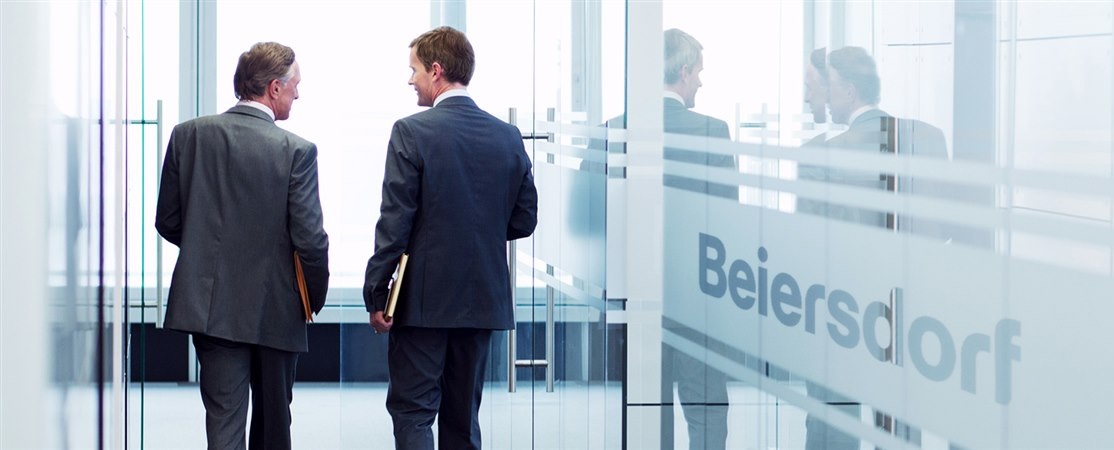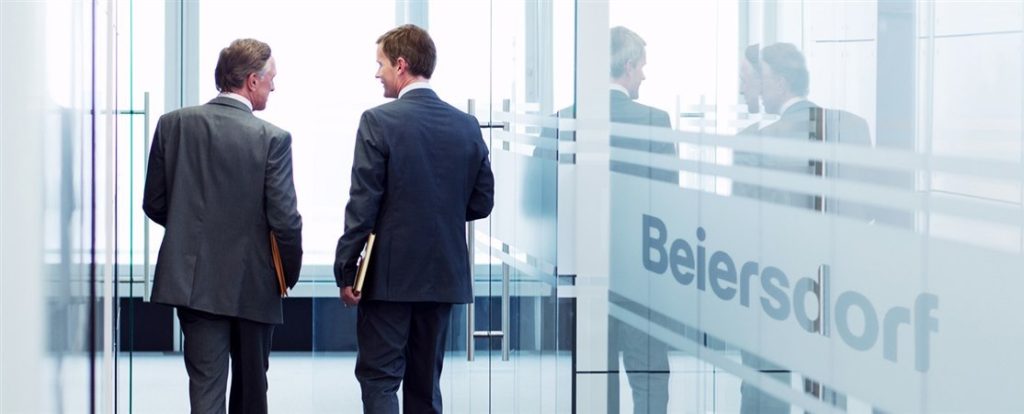Additional €70 to 80 million p.a. into new markets, innovation, digitalization and up-skilling
- New strategy C.A.R.E.+ with additional investment as a response towards profound transformation of the industry
- Increase organic sales growth in the Consumer Business Segment to 4-6% and develop EBIT margin to 16-17% by the year 2023
- 2019 is a year of transition: Organic sales growth of 3-5%, EBIT margin 14-14.5% in the Consumer Business Segment
- Partial reinvestment of productivity gains to fuel growth
Beiersdorf AG, Hamburg, launches the new strategy program C.A.R.E.+ under CEO Stefan De Loecker to realign its Consumer Business Segment. This segment accounted for over 80% of Beiersdorf Group Sales in 2018.
“The consumer goods industry is undergoing a historical disruption. Our entire business model needs timely adaptation due to new market realities and fast-changing technology developments”, says Stefan De Loecker. “This requires first and foremost higher investments. We at Beiersdorf are motivated and prepared to kick-start this phase of transformation.”
With C.A.R.E.+ Beiersdorf sets off a multi-year investment program, with €70 to 80 million additional investments starting 2019 to boost the opening of new markets, innovations, digitalization and up-skilling of workforce. Beiersdorf sees this as an opportunity to continue its strong growth while further improving the quality of it. This means to increase the organic growth in the Consumer business segment to 4-6% and to develop EBIT margin to 16-17% by the year 2023.
“CARE has always been the core of Beiersdorf. The new composition of the letters in C.A.R.E.+ sharpens our forward-looking mind-set. It will enable us to rigorously implement the new strategy in the coming years,” explains Stefan De Loecker, who took over as CEO on January 1, 2019. “During these times of profound disruption, C.A.R.E.+ has to be founded on Courage, Aspiration, Responsibility and Empathy. The plus sign at the end underscores our commitment to create more value with C.A.R.E.+ for people and society in the long term.”
The C.A.R.E.+ program comprises five strategic priorities:
- Accelerating the presence in white spots and new business areas
- Strengthening skin care categories of the portfolio
- Stepping up digitalization, from consumer engagement to business processes
- Improving productivity gains to fuel growth
- Social and environment commitment that truly benefits people
“For each of the five priorities, there are already concrete projects included in the business plan. With the additional investments, more initiatives will be selected. Not everything will immediately become a great success. We are prepared for that. With C.A.R.E.+, we aim to strengthen a corporate culture where heartfelt commitment and quick learning is encouraged and appreciated,” says Stefan De Loecker.
The Supervisory Board strongly supports the Executive Board’s new strategy of again putting Beiersdorf’s strengths as a pioneer in skin care first and unlocking the new potential. “It is precisely the opportunities of disruption, coupled with a long-term vision, investments, and agility, that create more sustainable value for all – for consumers, business partners, employees, and shareholders,” comments Reinhard Pöllath, Chairman of the Supervisory Board.
Beiersdorf will continue funding growth with its own efforts and means also in the future. Annual capex investments of €250 million to €350 million from 2019 onwards are earmarked for expanding capacity, for extending the product portfolio and for technological developments.
“With net liquidity of €4.4 billion and a robust balance sheet, we are able to comfortably shoulder the planned investment and growth plans under the C.A.R.E.+ program. We will no doubt maintain our traditionally high financial discipline. Therefore, on top of additional investments, we are also defining measures to increase productivity. Both go hand in hand,” adds Dessi Temperley, CFO of Beiersdorf AG.
The tesa Business Segment will continue to expand its solution-driven technological leadership over the coming years through targeted investments and acquisitions. tesa’s strong presence in China as well as its diversified customer portfolio make it a particularly valuable and complementary asset of the Beiersdorf Group. tesa aims for mid-term sales growth of an average 2% above the market, with an EBIT margin maintained above the 15% threshold.
Forecast for 2019: Organic sales growth 3–5% – EBIT margin lower due to investments
Despite an increasingly uncertain economic environment overall, Beiersdorf expects organic group sales in 2019 to increase by 3–5% – above market growth. It is expected that the Consumer Business Segment will also expand by 3–5%. tesa sales are planned to be up by 3–4%. Beiersdorf expects that investments in C.A.R.E.+ will lead to the decline of EBIT margin to 14.0–14.5% in 2019 in the Consumer Business Segment. The EBIT margin of tesa is forecast slightly below the prior-year level; EBIT margin of the Beiersdorf Group is expected to be around 14.5%.
Solid growth in 2018 despite challenging market environment
Beiersdorf AG continued on its growth path in the 2018 financial year despite increasingly difficult conditions over the course of the year. Group sales improved by 5.4% in organic terms and by 2.5% in nominal terms from €7.056 billion in the previous year to €7.233 billion. Earnings before interest and taxes (EBIT) and special factors increased by 2.3% from €1.088 billion to €1.113 billion despite negative foreign exchange effects at Group level; the EBIT margin remained stable at 15.4%. Owing to a significant improvement in the financial result and the tax rate, profit after tax excluding special factors rose by 9.6% from €689 million to €756 million, and earnings per share excluding special factors increased from €2.96 to €3.26 correspondingly.
Consumer Business Segment with solid growth and EBIT margin of 15.3%
The Consumer Business Segment increased sales by 5.0% in organic terms and by 1.6% in nominal terms to €5.890 billion, compared with €5.799 billion in the previous year. NIVEA increased organic sales by 2.8%. The Derma brands Eucerin and Aquaphor achieved a growth rate of 5.9%. The selective cosmetics brand La Prairie recorded an outstanding rise in sales of 38.5%, while the Healthcare brands Hansaplast and Elastoplast brands were weaker, with sales down 1.8% on the previous year.
Even though Beiersdorf was facing some challenging conditions, almost all regions contributed to sales growth. In Europe, organic sales were up 4.2% driven also by La Prairie’s strong travel retail business. Sales in Western Europe exceeded the prior-year figure by 3.9%, and in Eastern Europe by 5.3%. Sales in the Americas region increased by 1.1%. While sales in Latin America were down 2.8% (+4.0% adjusted for Argentina), North America had further growth of 7.3%. Growth rates in the region Africa/Asia/Australia were particularly encouraging with 8.8%.
EBIT excluding special factors was €903 million (previous year: €881 million), while the corresponding EBIT margin rose to 15.3% (previous year: 15.2%)
tesa Business Segment increases organic sales by 6.8% – EBIT margin at 15.7%
Organic sales in the tesa Business Segment rose by 6.8%, an increase significantly higher than the previous year. The increase in sales due to acquisitions was offset by negative exchange rate effects of a similar amount. As a result, sales growth was also 6.8% in nominal terms. Sales reached €1.343 billion (previous year: €1.257 billion). Both the Direct Industries and Trade Markets segments contributed to the strong performance of tesa.
EBIT increased to €210 million (previous year: €207 million). The EBIT margin was 15.7% (previous year: 16.5%).
Strong balance sheet
The balance sheet of the Beiersdorf Group has strengthened further in 2018. Net liquidity has increased by 5.1% from €4.189 billion to €4.402 billion. At the same time, the Group stepped up investments compared with previous years. Capital expenditures increased from €195 million to €463 million year on year, of which around €105 million was attributed to acquisitions in the tesa Business Segment.


